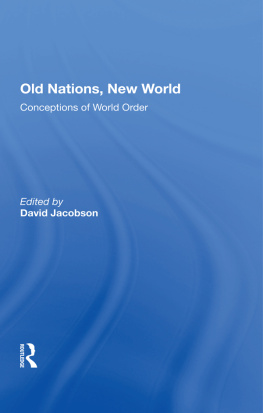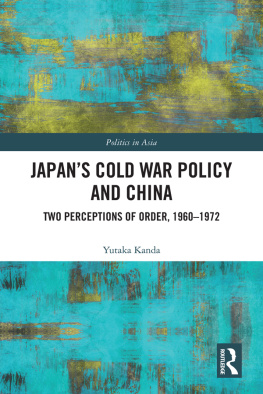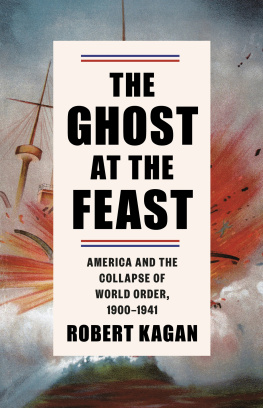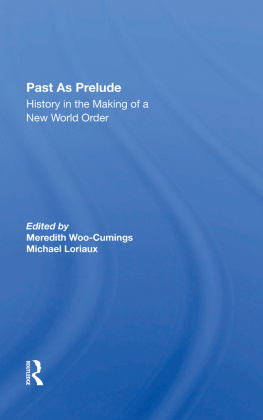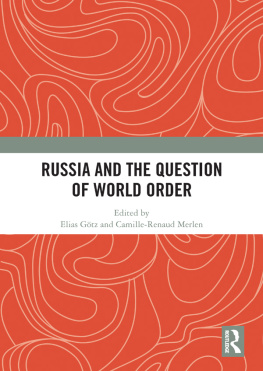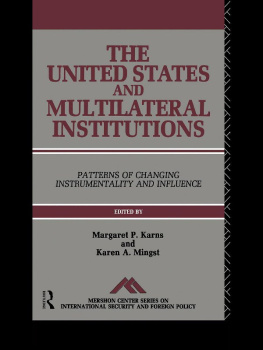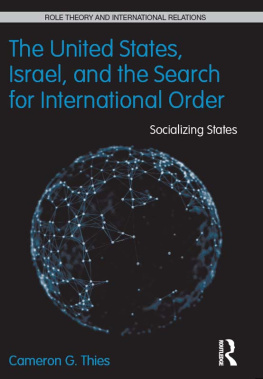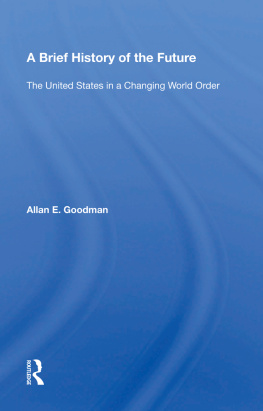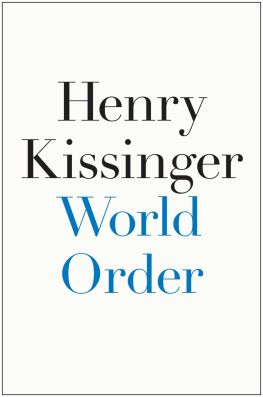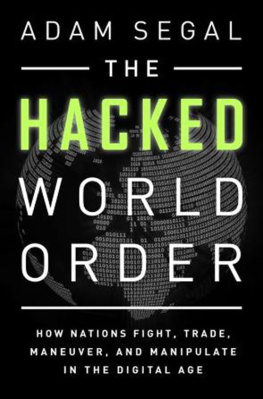First published 1994 by Westview Press
Published 2019 by Routledge
52 Vanderbilt Avenue, New York, NY 10017
2 Park Square, Milton Park, Abingdon, Oxon OX14 4RN
Routledge is an imprint of the Taylor & Francis Group, an informa business
Copyright 1994 Taylor & Francis
All rights reserved. No part of this book may be reprinted or reproduced or utilised in any form or by any electronic, mechanical, or other means, now known or hereafter invented, including photocopying and recording, or in any information storage or retrieval system, without permission in writing from the publishers.
Notice:
Product or corporate names may be trademarks or registered trademarks, and are used only for identification and explanation without intent to infringe.
Library of Congress Cataloging-in-Publication Data
Old nations, new world: conceptions of world order / [edited by]
David Jacobson.
p. cm.
Includes bibliographical references and index.
1. World politics1989 2. Post-communism. I. Jacobson, David,
1959 .
D860.039 1994
909.82dc20
93-44748
CIP
ISBN 13: 978-0-367-28180-9 (hbk)
The contributors to this volume had a role in defining the broader project as well as contributing their respective chapters. I am grateful to George Thomas for the many conversations we had both on the overall conceptualization of the volume and on editorial issues. I am indebted to Samuel Kim and Gilbert Rozman, with whom the initial discussions and formative exchanges on the project took place. Suzanne Keller has always been of great help and an intellectual inspiration. Yang Yanpin provided invaluable and tireless assistance with nary a complaint. My thanks also to Esther Hardesty, Sandra Balistreri, Elizabeth Sims, Rodney Ito and Bill Edwards for their help. Most of all, my thanks to my father, not only for his parental support but also for bringing his professional editorial skills to my aid!
George Thomas thanks the Evangelical Scholarship Initiative for a yearlong Research Fellowship that supported work for his chapter.
Research for Elizabeth Wishnicks chapter was carried out thanks to a postdoctoral fellowship from the Harvard Russian Research Center and a State Department Title VIII grant for postdoctoral research at the Hoover Institution.
Research for the Conclusion was supported by a Faculty Grant-in-Aid from the Office of Sponsored Projects of Arizona State University.
David Jacobson
1
Introduction: The Global Present
David Jacobson
The term world, when it is used as metaphor (world view, New World, Old World), is both a bounded and boundless concept. It encompasses a specific vision (the Buddhist world view, the Judeo-Christian world view, the communist world view, and so on). Yet the vision, within, so to speak, its own world, captures totality, the infinite. The word world is also used to describe the boundaries between the finite and the infinite as in birth ("to bring into the world") and in death ("to pass on to the next world"). The world constitutes what is.
The advent of the term world order in popular discourse expresses at one and the same time both the metaphoric and the literal meaning of the term. It is significant that cross-nationally statesmen, the media and academics talk of a world order; there is broad recognition that we live in the same world, that the world is boundless (if not borderless) and singular in a way it never has been before. When civilizations or ideological systems clashed in the pastduring western colonization or the Cold War, for examplestruggles ensued over the very way the world-out-there was to be classified and defined. In the West, at least, there has been since the 19th century a tendency to conceive of the world in terms of a unified narrative, with a unified concept of time and space. By an enormous act of faith, Robert Nisbet notes, it was assumed that the chronology of western Europe is the chronology of mankind. Different cultures and peoples were acknowledged, certainly, but they are perceived as all belonging to one tapestry, the same great story. Only now, however, can we truly think in these terms. Only now can we entertain the notion, if tentatively, that the clash of different ideologies and world views is a thing of the past, that we have reached the End of History and liberalism reigns triumphant. And, in the literal sense, world order refers, of course, to the whole world.
Hence the term world order implies a qualitative change in the international arena and not just another shuffling of the balance of power, as hitherto predominant theories of international relations would predict. Neorealists, who view states acting uniformly in terms of their national interests, unfettered by ideological beliefs, find the present changes a serious challenge; why did new alliances that reflect the new power balances not form? On the contrary, alliances between nations held firm (though they changed in form), or became undone, according to the ideological proclivities of the parties concerned.
It is paradoxical, however, that references to the world order are made, with the implication that a single global community is on the horizon, at least in the northern tier of countries, just when it is evident that many new conflicts have erupted. Bloody fighting in the former Yugoslavia and the former Soviet Union come to mind but, on a lesser scale, internal dissension in Western Europe is a case in point as well. Indeed, the international arena appears to have few defining parameters and demonstrates a certain turbulence. Ironically, the Cold War united the world as much as it divided it, providing a framework for different states to locate themselves in the global game, and rules by which to conduct themselves. Even among the Cold War rivals, there were explicit and tacit rules of understanding, about spheres of influence and acceptable forms of conduct. That framework is gone.
The end of the Cold War has also revealed the intricate linkage between the international order and domestic institutions. The Cold War was a defining element for many countries, defining not only their role in the world but their sense of self. In the wake of the Cold War, as the contributions to this volume demonstrate, many countries question not only their role in the new world order but what their domestic raison is. With unification, for example, Germany has to grapple with issues of national identity and purpose. The United States has lost its anti-communism cause that gave it moral direction. Japan finds that it cannot rely on the American umbrella to the same degree and that it may have to emerge from its traditional insularity. The states of the former Soviet Union seek national self-determination and sovereignty while seeking acceptance and the help of regional and international organizations that are less wedded to traditional state-centrism (like the Conference on Security and Cooperation in Europe).
The pulling apart of the Iron Curtain has revealed a quilta quilt of nation states, regional organizations and sub-national groups competing for dominance. Old and new nations were brought into focus; a variety of historical, cultural, political and economic forces now demanded attention.

